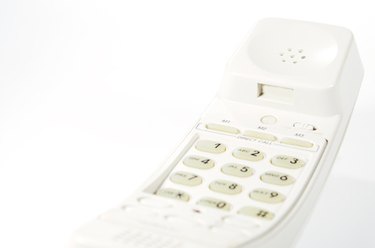
Call waiting is a feature offered by a number of telephone service providers, including AT&T, that allows a phone user to answer an incoming call while talking on the phone with someone else. Generally, the method used to notify the user that another call is coming through is a high-pitched and extended beeping sound, repeated every five to 10 seconds until the incoming call is answered or the caller hangs up. This beeping sound can sometimes be annoying, especially when a phone user is on an important call. For this reason, it is helpful to know how to temporarily disable call waiting.
Disabling AT&T Call Waiting Before Making a Call
Video of the Day
Step 1
Lift the phone off its base, press the "Talk" or "On" button (usually only necessary when using a cordless phone), and wait until the dial tone can be heard.
Video of the Day
Step 2
Press the * key (generally located at the bottom left of a phone's keypad), then dial 70.
Step 3
Dial the phone number of the desired person or place once the dial tone returns.
After hanging up the phone at the end of the call, call waiting will automatically reactivate. This process must be repeated for each call in which call waiting needs to be deactivated.
Disabling AT&T Call Waiting During a Call
Step 1
Tap the receiver button on the phone's base briefly or press the "Flash" button (on cordless phones) after the party on the other line has been asked to hold.
Step 2
Once a dial tone can be heard, dial the * key (usually located at the bottom right of a phone's keypad), then dial 70.
Step 3
Tap the receiver button briefly or press the "flash" button again to return to the original call.
Call waiting will only be disabled for the current call, and will need to be disabled again before or during future calls when desired.